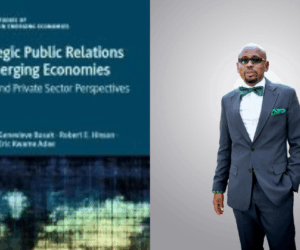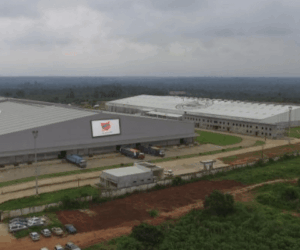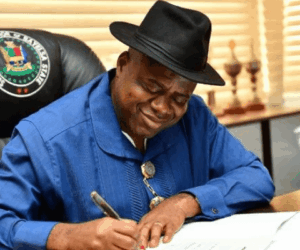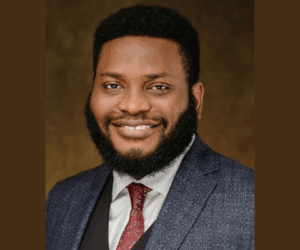Hopes are high that the South-South/East is about to begin an explosive acceleration in the digital economy.
Three things seem to happen at same time to fuel this belief: the much-expected ocean-based optic fibre has landed at Qua Iboe in Akwa Ibom State at last; Equinix, which acquired Main One, the company handling this, says it is fast building a data centre in Port Harcourt to make te south-south/east have heavy internet traffic that attracts companies around the world; and StartupSouth which creates a digital hub, is now 10 years and has caused explosion in the startup ecosystem.
These were revealed at the day one of the StartupSouthX conference in Port Harcourt which took place in two days.

Two experts unveiled the works going on in the sea and what is going on in the upland to add up and make the ecosystem surge forward. Ikechukwu Mamah, Senior Manager, Network Services Delivery, Equinix West Africa (the company that acquired Main One), made revelations on shortening the path to boundless connectivity in South-South Nigeria. Aniedi Udo-Obong, Developer Ecosystem (Program Partnerships), Google, spoke on moving from problems to possibility by unlocking growth with artificial intelligence (AI).
Uche Aniche, founder and convener of StartupSouth, which is 10 years at the moment, told newsmen that the south-south/east is not lagging behind in the digital economy race. He announced that the digital economy has overtaken all other sectors including oil/gas in contributing the gross domestic product of Nigeria which is running at 4.2%. Reports put digital economy at about 18% wheas oil/gas is below 6%.
In his presentation at the StartupSouth international conference in Port Harcourt, Aniche said the region was not left behind despite years of tension in the area, but said a lot of work still needs to be done.

“The region is not lagging behind when it comes of digital solution. There are lots of people and huts building solutions, building opportunities in the region. We tried to capture those solutions and pockets of activities and tried to compare states and cities in various areas of digital endeavor.”
What is an issue, he said, however, is creating more pools of funders. “The only major observation in the report is that the region seems to struggle in terms of funding compared with places like Lagos. From investors perspective, Lagos seems better and attracts more funding attention.
“That is why we are intensifying efforts in promoting angel investors forums aimed at establishing more angel networks starting with the Imo Business Network. By the time that one comes on stream, we would have the second angel funding network. We already have one operating in Rivers State though for the whole of South-South and East. We need more networks so the conversation will widen and deepen.”
He admitted that some creatives prefer to leave the zone but showed some of the advantages of staying back, saying where you are fleeing to, somebody built what you are looking for. “It is not in my place to tell anybody to remain in PH. We are free citizens and are free to move anywhere, but the opportunity you look for elsewhere was built by someone. You can consider building the opportunity where you stay. People take such decision because of structural support, and that is what we are trying to provide.”
He said startup is about speed, decentralize, act, build, connet, and grow. “Digital economy is one of the fastest and quickest ways to build significantly. That is why we are making sure that more people come into startup ecosystem.
“For the first time in our history, the Digital Economy has contributed more to Nigeria’s GDP than oil/gas. It think it only makes sense for us to double down and look into the sector that is not fully developed but is surpassing the developed sector of our economy.
“You can imagine what would happen when it is fully developed. That is what motives us to do more on startup ecosystem.”

Fibre optics by sea:
The mouthwatering contributions by optic fibre which has arrived by sea to Akwa Ibom was made exciting by Mamah of Equinix West Africa.
He said: “With optic fibre landing in South-South (Akwa Ibom), internet access and operations would be faster in the region. This comes with many fallouts such as companies deciding where to locate, etc.
“It also means companies can duplicate their storage. You can duplicate or mirror it in the south-south what you have in Lagos. It is very important.”
He reacted to power supply issues, saying it is critical because a data centre must be on supply 100%. “It is a problem everywhere including the US. Some data centres use power more than the entire Nigeria. That is how serious data centres are. What we are doing here in PH is what we call Tier 3 which means we have to have what we call power redundancy. We are not depending only on public power supply, we also generate power locally plus use of UPS and Inverters to hold power in nano-seconds before changing to alternative power system.”
On how governments in the region can help, Mamah said: “We need government because of the industry, not about us. For example, we need to lay cables from Data centre to other places and states. It will require Right of Way (ROW) issues. If the cost of ROW is expensive, it means the cost of service will be expensive. Government should develop ROW strategy. Some states have zero ROW fee, some charge only N1. Governments in southern Nigeria should find how to enable this revolution.
“Some just damage the cables and companies have to come back and rebuild and rebuild. Some construction companies do not put service points so we do not have to dig again and again. We just plug in.”
He said the North usually allows free Right of Way (ROW) and asks for benefits. “Yes, the current Akwa Ibom government is very receptive and they understand the kind of thing that has come to their state. They have given us free ROW and have made some requests not in cash. They want us to enable their state with efficiency in places such as schools, hospitals, government centres.”
He said one major benefit of a Data Base in the south-south/east is opportunity to duplicate the data base. On optic fibre presence, he admitted that Satellite system makes your call to go to UK first and back. But with the submarine system, it is different. “You have one pipe taking all your messages at same time. It is cheaper though very expensive to deploy.
“Why we are setting up data base in PH. You must extend from the landing state to other states. There are states where you cannot land because they do not have connection to the ocean. You must need terrestrial cables to other cities.”
On attitude change, the expert said it is not just in the government alone but that it is general. “This is because some five years ago, people saw optic fibre cables as another oil pipeline and so raised their expectations. Now, they know it is not oil.
They also loved to steal it, but they have now realized that you cannot use the cable or melt it into any other thing. They now rather realise that they need it for communication. In some places, hoodlums even help to protect the cables. They see it as the peoples’ asset.”
He said what they need are road ducts so they can just connect. “With these things, cost will go up or down in your region depending on how you behave. This will impact either capital or recurrent costs.”
On how startup can become a revolution in the south-south/east,
How to create economic revoluion in region:
Aniedi Udo-Obong (Developer Ecosystem, Programme Partnerships, Google), spoke on problems to possibility: Unlocking growth with AI. On how to fastrack startup in the south-south, he said it is a mindset issue, and the mindset should be that of someone who wants to create. “Even in the south-south, we consume a lot of content. (This means the market is there). We watch a lot of movies and use our phones effectively to consume.
“Sometimes, we do not even know we can create. So, you have to begin to see yourself as a creator, not just consumer. Look up to someone that you think is like you, that comes from background like you. It should motivate you to think creatively, to believe you too can do it.”
He appealed to stakeholders to make the youths see opportunities in the tech world by supporting events such as StartupSouth that can bring ideas to the youths. “I know how much Uche Aniche has put into this project in the past 10 years. Its now getting traction.”
He called for continuous training, saing he has seen some efforts from the Niger Delta development Commission (NDDC) from Partnership Initiative in Niger Delta (PIND), state governments, etc, coming up with programmes, but that more was needed.
“Our education sector must wake up: Primary, secondary, tertiary institutions must add IT in their curriculum. We had JET clubs, etc, now STEM. Investments in these areas are urgently needed.
“Every career today succeeds with tech. If you farm today without tech support, it will be wrong. Healthcare, sports, music, etc, tech is compulsory. People imagine the complicated things as tech, but there are levels. I came with three presentation models but when I saw the audience, school children inclusive, I decided the template to use. Don’t give up. We must carry along all sectors.
“Some companies sponsor big social events but if you want to help young people with tech and entrepreneurship, you hardly can find big sponsors. Just N20m will be difficult to raise but they splash hundreds of millions of naira on socials. Corporate Social Responsibility (CSR) votes should be raised.”
He said upscaling is key. “Often, people say teach children this, teach that, but nobody has considered who will do the teaching. You must train the trainers for sometime first. Teach civil servants to teach others.
“Tech is not rocket science. Start somewhere. Some states and some countries in Africa have taken off. Even the far east and Singapore are working hard. Copy and adapt.”
Shaping the next decade:
A professor and finance expert who is also founder and president of the Garden City Premier Business School spoke the ignite the area. Sylva Opuala-Charles, ex-banker and onetime commissioner of finance and economic planning in Bayelsa State, speaking on shaping the next decade said StartupSouth has become a top brand in the technology space and that his school as a key player in creating global entrepreneurs through research innovation was excited about the contributions of StartupSouth, the collaborations and the growing influence.
“Kauffman Foundation in 2011 stated that startups are responsible for the net job growth in the United States. Startups are fundamental in accelerating and shaping the economies of the top developed and emerging economies. Between the US and China they own 90 percent of global innovation platforms from Apple, Nvidia, Alphabet, Facebook, Amazon, Alibaba etc., based on recent United Nations Conference on Trade and Development(UNCTAD) report.
“You can imagine that is quite stunning, isn’t it? The market capitalization of these platforms are competing with the global GDP @ about $115 trillion. Again, the US and China control about 45 percent of the global GDP with technology entrepreneurs mainly responsible for lopsided and phenomenal contributions to global economic prosperity and productivity.”
In fact, he said, the market capitalization of US and China Equity market is estimated at $70 trillion with the two countries accounting for over half of world billionaires (USA has 902 and China has 516).”
He they were two types of entrepreneurs: the high-impact entrepreneurs and low-impact entrepreneurs. “The intensity, quality and quantity of entrepreneurs vary across countries. The lower-impact entrepreneurs are prevalent in less developed countries while the high-impact or growth entrepreneurs, who stimulated today by digital transformation, are found more in the developed countries.
“There is a nexus between high-impact entrepreneurial activities and economic growth. The more entrepreneurs whether low impact or high impact a country grows, the more it translates to the macroeconomic productivity.
“There is this concept of dynamic efficiency; Dynamic efficiency is an economic concept referring to the ability of a firm or economy to innovate, adapt, and improve its performance over time through research and development, new technologies, and better processes to meet changing market demands.
“It focuses on long-term growth and welfare by emphasizing continuous improvements in productivity and the creation of new and better products, rather than static resource allocation at a single point in time.”
He said key drivers include innovation, entrepreneurship, investment in human capital, and the protection of intellectual property. “High impact entrepreneurial growth is intentional towards a country’s business and industrial sector, which ultimately dovetail to its economic transformation.
“The world has since moved on with digital transformation, disrupting traditional sectors with digital products and services and moving away from analog processes, methods, processes, products and services.
SME revoltion:
Opuala-Charles showed how startup and small and medium enterprises (SMEs) work together to create boom in serious-minded economies. “With SME (Small and Medium Enterprises) contributing about 46% to Nigeria’s GDP, over 95% to businesses and 87% to its employments is a greenfield opportunity for Nigeria and the entrepreneurs with the adoption of digital technologies.
“For example, recent studies have shown that a 1% increase in digital ecosystem development has shown the potential to increase GDP per capita by 0.13%, while one study found a 1% increase in internet users can correlate with a 1.18% increase in GDP per capita. That means if we invest more in research and development in digital business innovation by 1%, it can correspondingly increase the economic wellbeing and living standards by 0.15 percent annually.
“Technology adoption could be the game changer for Nigeria’s $1trillion GDP aspirations across its sectors. This could be majorly aided by research and development investment expenditure. Research and Development (R&D) expenditure is the gross domestic spending on research and development, as a percentage of GDP.
“The world average is 2.67%. The US is at 3.59% as against less than 0.5% for Nigeria. For instance, technology adoption in revenue collection could improve the country’s revenue generation by over 50% in the medium term. We are already seeing this happening with the government generating over N20 trillion in revenues by August 2025 as against half of this in the corresponding period of last year with increased technology adoption in the process. With technology adoption in procurement, expenditure management in government and the private sector will be a major turning point for Nigeria’s growth and development.”
Conclusion:
On this note, all eyes now seem trained on Port Harcourt and south-south/east as a new driver in startup revolution and digital economic revolution.









